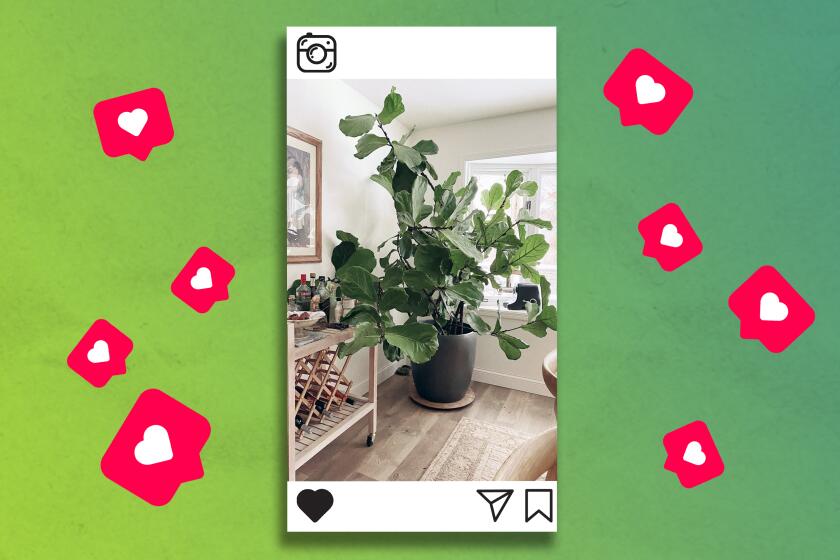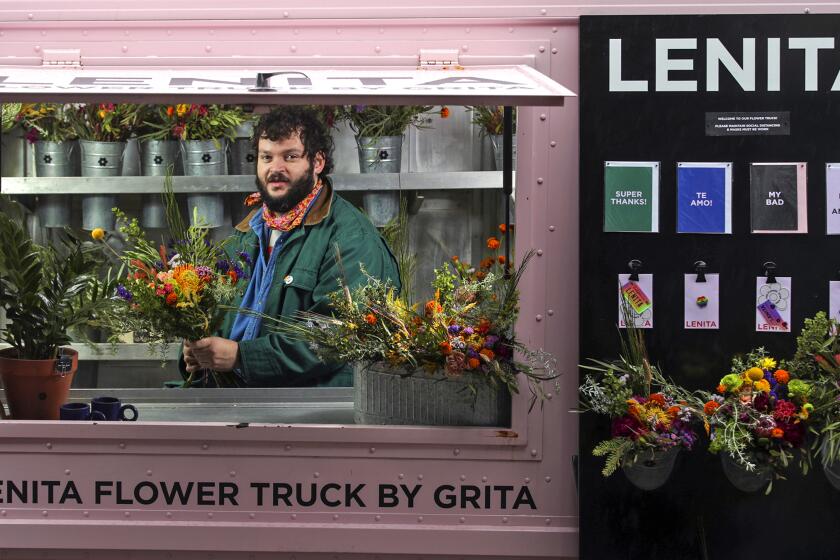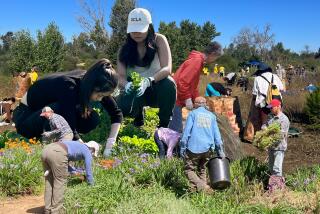SoCal garden nurseries were overwhelmed in 2020. How are they preparing for 2021?
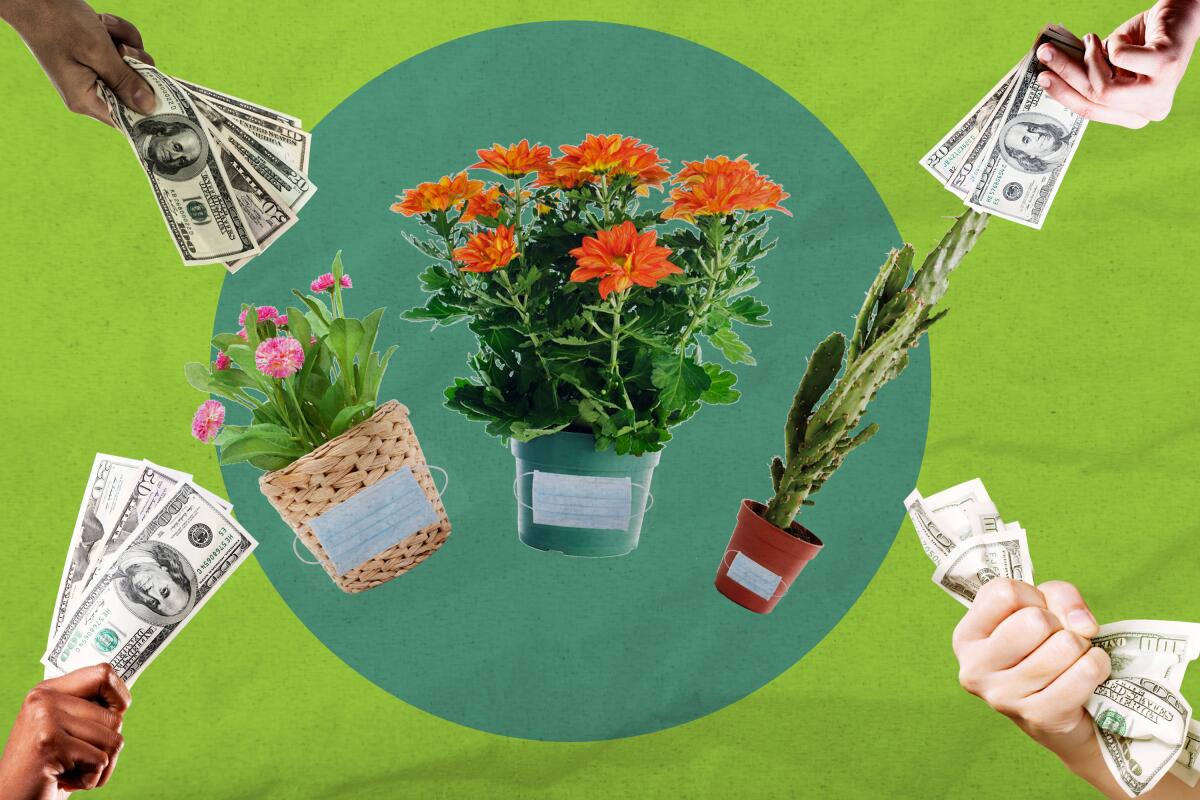
- Share via
You know that nightmare where you’re running as fast as you can, but you just can’t keep up? Then you’ll totally understand the sleep-deprived, breakneck ride that Southern California’s plant nurseries and growers went on in 2020 — and are bracing for today.
On the face of it, 2020 was a great business year. Most nurseries reported huge increases in sales and first-time customers eager to grow their own food — even in containers — or enrich their homes with beautiful plants.
But the stress and sheer labor involved in reconfiguring their businesses to keep staff and customers safe during the pandemic? That was another story, a hair-raising tale still bleeding into 2021.
In our Plant PPL series, we interview people of color in the plant world, including plantfluencers, plant stylists, floral artists, enthusiasts, experts and garden store owners.
“I would describe it as an extraordinary year for anybody in the nursery business because their method of retail had to change radically if they were going to stay in business,” said Conor Fitzpatrick, owner of Fig Earth Supply in Mount Washington.
Many small nurseries like Fitzpatrick’s closed their doors to on-site customers early in the pandemic, but he managed to stay in business because his manager, Samantha Dargis Torres, did the “Trojan work” of putting all the inventory online in just four days.
Sales were limited to curbside pickups and deliveries, but his nursery still saw record sales, he said, and keeping enough inventory and staff to handle the demand was stressful. “We had to have a complete change in operation, and our demand still probably went up 50%, but I take no pleasure in saying it,” Fitzpatrick said.
A listing for a fiddle-leaf fig on Instagram causes houseplant fans to wonder, “What’s your secret?”
There’s no pleasure, he said, in doing well when others are suffering in a pandemic, a sentiment repeated by others. Every nursery owner reported record or near-record business, but no one is gloating. They’re tired and a bit apprehensive about what’s to come.
“The last thing I said to my husband last night was, ‘Someday we’ll be rested again,’” said Lauri Kranz, co-owner of Edible Gardens L.A., who almost overnight pivoted her new organic farm business supplying restaurant chefs into a farm-box home delivery system that has 3,500 customers.
“We’re up at 4 every day and work until it’s very late, and the year is moving for me like the speed of light, but I will say we feel deeply grateful, lack of sleep and all.”
Graphic designer Nemuel DePaula’s flower truck, Lenita by Grita, has become his lifeline during COVID-19. His motto: ‘Stop and smell the flores.’
In addition to the farm-box business, which involves several small organic farmers suddenly out of buyers when restaurants closed, Kranz builds home gardens for people — and the demand skyrocketed in 2020 to the point that she has temporarily stopped taking new clients. Kranz has always been busy building gardens for well-to-do people, but now she says there’s a new urgency.
“People feel like gardening is necessary now.” she said, “I’ve been contacted by people who are celebrating a milestone birthday or anniversary. And where in the past they might have taken a big trip, now they’re saying, ‘I want to invest in something at home that’s going to sustain us.’ ”
Cathy Hough, general manager and buyer for Marina del Rey Garden Center, never had to close her doors; social distancing isn’t a problem at her 2-acre, mostly outdoors facility. Her troubles were having enough staff and inventory to keep up with demand.
Get The Wild newsletter.
The essential weekly guide to enjoying the outdoors in Southern California. Insider tips on the best of our beaches, trails, parks, deserts, forests and mountains.
You may occasionally receive promotional content from the Los Angeles Times.
“It was a record, definitely our best year in all of our 42 years, with a 30% increase in customers” she said. “First it was demand for all edible things, vegetables and herbs, probably double” the previous year’s volume. “Then sales on our pots increased dramatically, from people living in small spaces who wanted to be part of that gardening craze. And our indoor plant sales were up 66%.”
She added: “Don’t you think that’s about people being home more and wanting something pretty to look at in their house?”
Hough said she’s expecting continued interest from all those newbie gardeners, but it’s hard to know whether the demand will be as intense. Like other nurseries, she’s trying to stockpile in anticipation of peak demand starting in March, the traditional time Southern California gardeners want to start their summer plantings.
Last year many suppliers ran short, and some are still struggling with how to keep up. “I just got a text from one of my soil suppliers who said, ‘We have the raw materials, but we don’t have the bags to put it in.’” Hough said. “Everybody is ramping up their manufacturing the best they can, but growers can only grow things so fast.’”
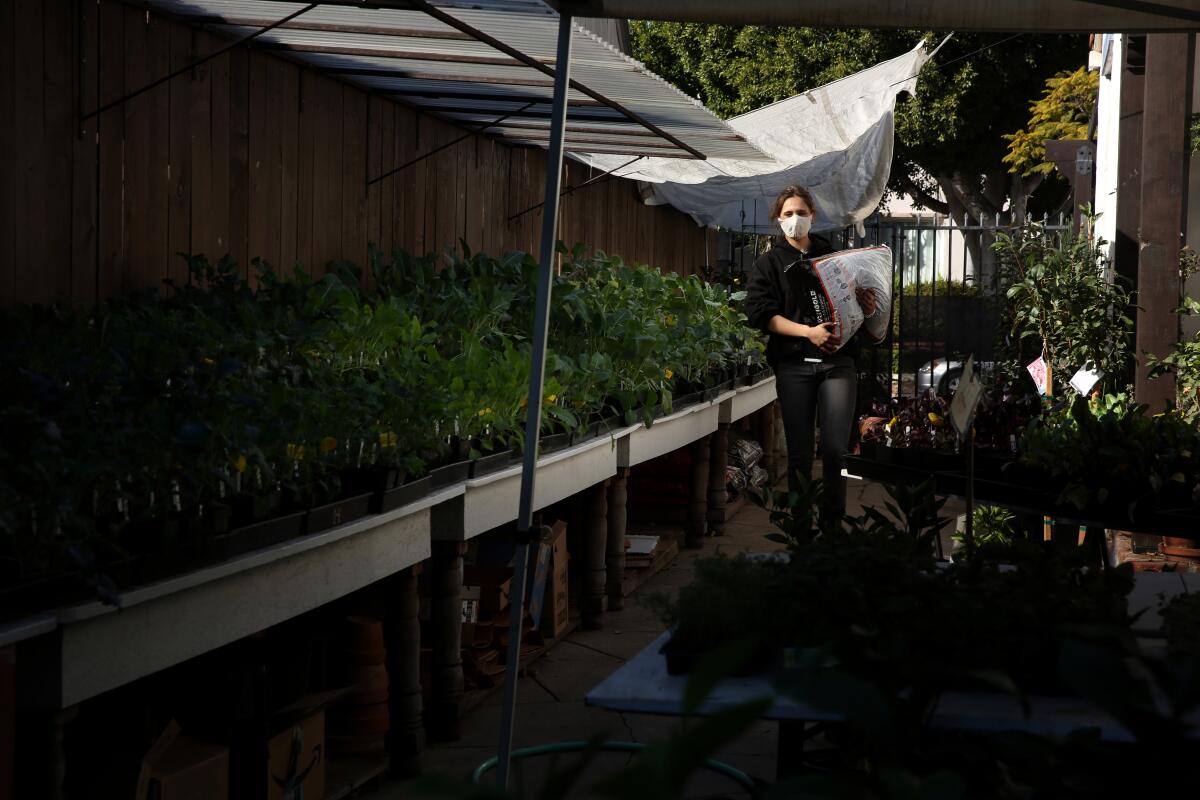
Keeping enough inventory is a constant concern for Jo Anne and Alejandro Trigo of Two Dog Organic Nursery in Mid-Wilshire, named L.A. Magazine’s best nursery in 2020. The nursery fills their small backyard and much of their front yard and porch, and every flat surface in their home is covered with seedling trays, since they start many of their vegetable plants from seed.
“We had 72.5% more in sales in 2020, and we added 2,000 new people to our mailing list,” said Jo Anne. “That was really shocking too, but I feel it in my tiredness. I’m a little nervous about this year; people are already anxious about wanting plants for the spring, and we don’t do our big rollout until March 13, so I’m trying to be super humanly organized. I found out last year we can’t leave anything to chance.”
That meant making her seed orders for the spring early last fall, after hearing about companies running out of seed. All the nursery’s orders are online, and it allows only curbside pickup, but like other nursery owners, Jo Anne frets about finding time to chat with the new gardeners who have so many questions. That’s why she and other nurseries are adding explainers on their websites.
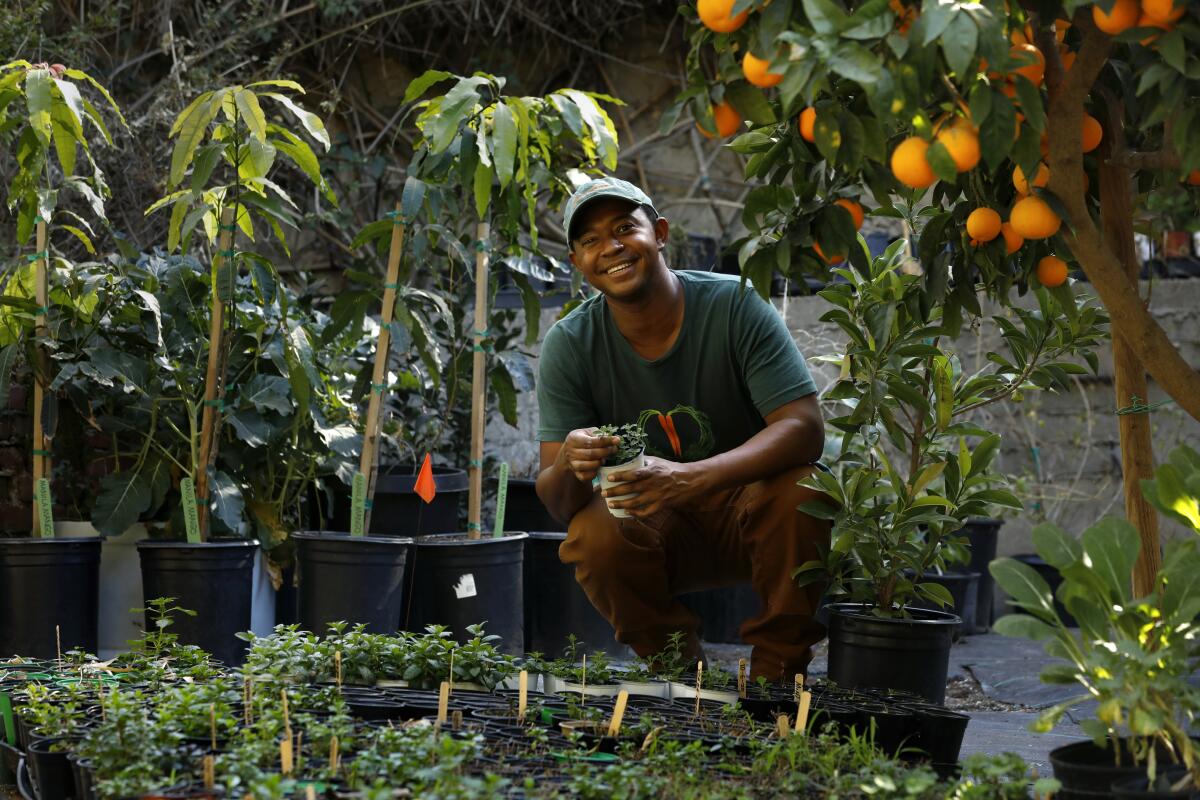
Logan Williams, co-owner of Logan’s Gardens who sells most of his veggie and herb plants at farmers markets in Santa Monica and Hollywood, says he’s noticed more questions and sales from first-time gardeners. He figures that’s because the pandemic “kept us from being close to family and friends, so a lot of people were transferring that love to their gardens.”
Williams said he’s getting lots more questions from apartment dwellers eager to grow food in their small spaces. “Most of the time I have to say, ‘No, you can’t grow that avocado tree in your bathroom,’ but I do say, if you have four hours of sun and space for a 15-gallon pot, you can grow the vast majority of fruit trees on a small corner balcony.”
Tomatomania!, the traditional harbinger of SoCal’s spring planting season, had a challenging 2020. It typically moves its 200-plus varieties of tomato and pepper plants to various venues for four to 10 days in the early spring, but the pandemic shutdowns in mid-March forced the business to cancel half its scheduled sales events.
This year Tomatomania will stay at fewer venues for longer periods, said Tomatomania owner Scott Daigre. For instance, it opens Feb. 26 for a monthlong stay at Roger’s Gardens in Corona del Mar, which is putting all of Tomatomania’s offerings there online. The hope, Daigre said, is that people won’t feel the need to crowd into the large nursery the first day looking for their favorite tomatoes because he’ll be restocking regularly so the venues don’t run out.
Daigre is planning monthlong visits at venues such as Tapia Bros. in Encino, Otto & Sons Nursery in Fillmore, and Underwood nurseries in Moorpark and Somis. Smaller nurseries such as Fig Earth Supply will have only a three-day visit, with shoppers buying online or visiting in person by appointment.
And mindful of last year’s huge interest in container gardening, Daigre said Tomatomania will be pushing a whole line of dwarf series tomatoes this year — stocky heirloom varieties bred to grow easily and prolifically in containers. He’s optimistic demand will remain strong.
“People invested a lot in their gardens and garden beds,” he said, “and I think we’re going to see all that enthusiasm again this year.”
More to Read
Sign up for The Wild
We’ll help you find the best places to hike, bike and run, as well as the perfect silent spots for meditation and yoga.
You may occasionally receive promotional content from the Los Angeles Times.

